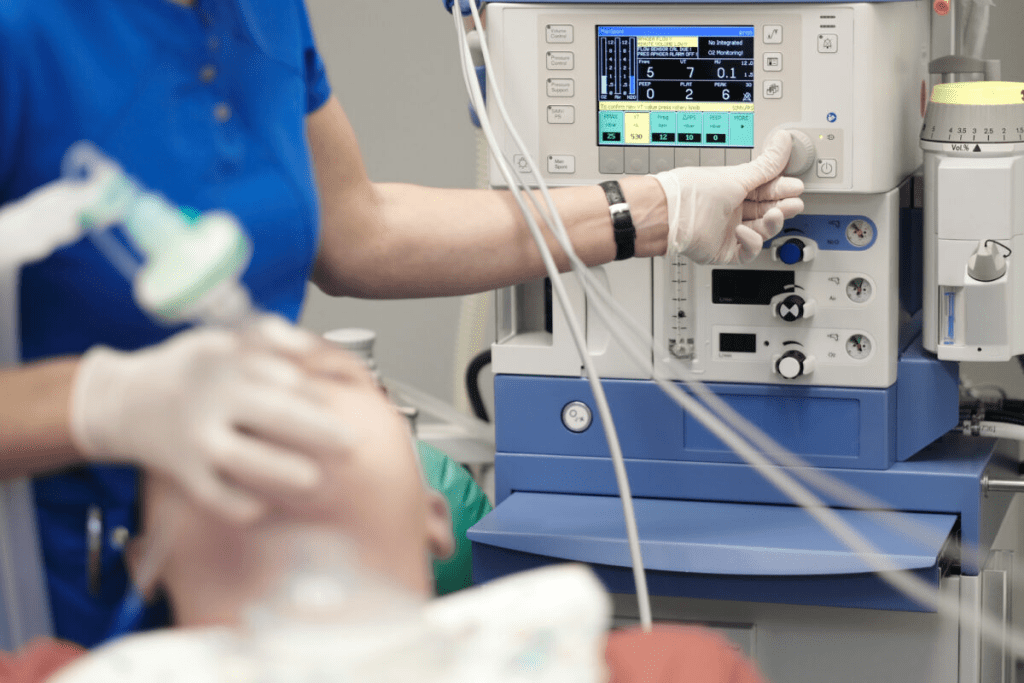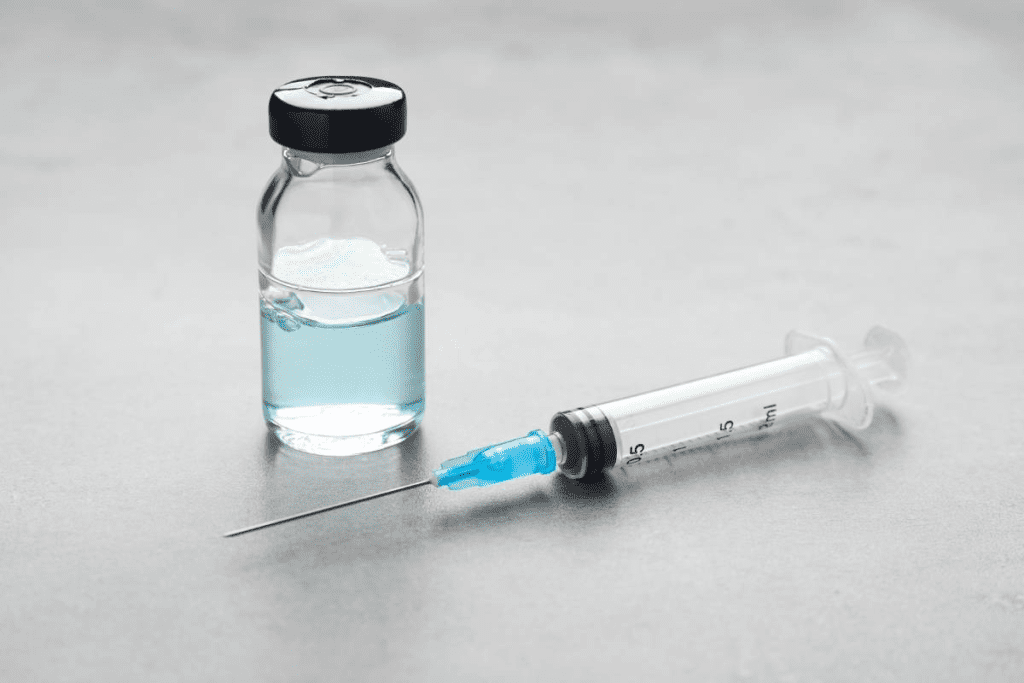Last Updated on November 14, 2025 by

Going under the knife can be scary, and worries about anesthesia are common. People want to know what anesthesia does, how it impacts their bodies, and how long does anesthesia stay in your system after surgery. General anesthesia is a mix of drugs that makes surgery easier by reducing pain, inducing unconsciousness, and stopping movement during the procedure.
Anesthesia and recovery are complex. While it’s very rare not to wake up from anesthesia”occurring in only about 0.25% of cases”it’s important to understand the normal recovery process and the factors that affect how long anesthesia stays in your system. On average, the risk of death from general anesthesia is about 1 in 250,000 patients, which highlights that it is generally safe.
In this article, we’ll dive deeper into anesthesia and its effects, explaining how long does anesthesia stay in your system, what influences its duration, and how recovery can vary from person to person. Our goal is to give you a full understanding of its risks, safety, and impact on the body.
Before surgery, knowing how general anesthesia works and what recovery is like can help ease worries. General anesthesia makes you lose consciousness and feel no pain. We watch your vital signs closely and adjust the anesthesia to keep you safe.
General anesthesia affects your whole body. It makes you unconscious and stops your muscles from moving. This keeps you from feeling pain during surgery. The effects of general anesthesia are reversible, and your body starts to wake up once it stops.
Your body’s automatic functions, like breathing and heartbeat, are helped by machines during surgery. The anesthesiologist keeps an eye on these and adjusts the anesthesia as needed. This ensures you stay comfortable and safe.
Most people wake up within minutes to an hour after the anesthesia stops. How long it takes can depend on the type of anesthesia, your health, and how fast you metabolize it. Usually, patients lose consciousness fast and wake up soon after surgery.
We keep a close eye on you in the recovery room until you’re fully awake and stable. The recovery team checks how awake you are, any pain, and any side effects from the anesthesia. They provide the care and support you need for a smooth recovery.
Anesthesia is generally safe, but it can rarely cause a person not to wake up. It’s important to understand this risk. We will look at how often this happens, the death rates, and the differences between delayed and failed emergence.
Delayed emergence from anesthesia is rare, occurring in about 0.25% of cases. This means it happens in roughly 1 in 400 surgeries. This shows how rare it is, but also why we need to know what causes it and its effects. Many things can cause delayed emergence, like the patient’s health, the surgery type, and the anesthetic used.

Many factors can affect how often delayed emergence happens. These include the patient’s age, health, and the surgery’s complexity. Knowing these helps anesthesiologists manage risks better.
The death rate from general anesthesia is about 1 in 250,000 patients. This low rate shows that not waking up is very rare but serious. Because of this, doctors closely watch and study anesthesia-related deaths to make care safer.
New ways to monitor and better anesthetics have lowered death rates. But the risk is small but real, so we must stay careful and keep improving care.
It’s key to tell delayed emergence apart from not waking up at all. Delayed emergence means taking longer to wake up, while not waking up is a more serious issue. Knowing the difference helps doctors respond and care for the patient better.
To tell these apart, doctors use clinical checks and tests. This helps find the cause and decide how to treat and support the patient.
Understanding how long anesthesia stays in your system involves looking at several factors. These include the type of anesthesia and the individual patient’s characteristics. The effects of anesthesia can vary greatly from one person to another.
Anesthetic agents are broken down and removed by the body at different rates. For example, propofol, a common anesthetic, is quickly metabolized. This makes it have a short duration of action. In contrast, some inhalational anesthetics may take longer to leave the body.
The liver is where most anesthetic agents are metabolized. Some agents rely more on liver metabolism than others. The body then removes the byproducts through the kidneys or, to a lesser extent, through the lungs.

Several factors can affect how long anesthesia stays in the system. Age is a key factor, as older adults may metabolize drugs more slowly. Kidney function also plays a big role, with impaired function potentially leading to longer anesthesia effects.
Other factors include liver function, overall health, and metabolic disorders. Patients with liver or kidney issues may need different anesthetics to avoid prolonged effects.
Some people may take longer to clear anesthesia due to various reasons. Genetic variations, interactions with other medications, or health conditions can play a role. For instance, certain genetic polymorphisms can affect how enzymes break down anesthetics, leading to longer recovery times.
Interactions with other medications can also impact how anesthetics are metabolized. It’s important for healthcare providers to know all medications a patient is taking. This helps avoid interactions that could prolong anesthesia’s effects.
Delayed awakening from anesthesia is a complex issue. It can be influenced by many medical and physiological factors. Knowing these causes is key to managing patient expectations and reducing anesthesia risks.
Residual effects of anesthetic drugs are a major cause of delayed awakening. Some medications can make anesthetics last longer, slowing down recovery. For example, benzodiazepines and opioids can make sedation last longer.
Residual drug effects can be managed by carefully adjusting anesthetic doses and watching patient responses. It’s also important for anesthesiologists to know about drug interactions to adjust treatment plans.
Metabolic disturbances, like hypothyroidism or adrenal insufficiency, can affect how the body processes anesthetics. Patients with these conditions may wake up later because their bodies metabolize drugs differently.
“Metabolic disturbances can complicate anesthesia recovery by affecting drug clearance and patient responsiveness.”
A popular Anesthesiologist
Neurological conditions, such as stroke or brain injury, can affect how the brain responds to anesthesia. These conditions may cause delayed awakening because the brain takes longer to recover.
Issues with temperature regulation, like hypothermia, can also cause delayed awakening. Hypothermia slows down metabolic processes, making anesthetic effects last longer.
Understanding these common causes of delayed awakening helps healthcare providers manage patient care better. It’s important to consider these factors before, during, and after surgery.
If a patient doesn’t wake up as expected after anesthesia, the medical team acts fast. This situation worries patients and their families. We’re here to help with the care and support they need.
We follow medical response protocols to handle this situation quickly. These protocols help us find the cause and take the right steps.
When a patient doesn’t wake up, we start by checking a few things. We look at the patient’s medical history and the anesthesia used. We also check for any drug interactions and do a physical exam to find complications.
Our goal is to keep the patient safe and comfortable. We work with the anesthesiologist and other doctors to decide the best action.
Based on what we find, we might give certain treatment interventions. This could be medications to reverse anesthesia effects or treating underlying conditions. Our aim is to give the right treatment for the patient’s needs.
We watch how the patient reacts to these treatments. If needed, we adjust our approach to help them better.
If a patient needs more care, we offer extended monitoring and support. This means watching them closely in a recovery or intensive care unit. We can quickly respond to any changes.
We also support the patient and their family emotionally. We know this is a tough time. Our team provides caring support to help the patient recover fully.
By following our medical protocols, giving the right treatments, and providing ongoing care, we aim for the best results for our patients.
It’s key for patients to know about anesthesia risks before surgery. Not waking up from anesthesia is very rare. But it’s important to understand the risks and side effects of anesthesia.
We’ve looked at how anesthesia works and how it affects recovery. We’ve also talked about how rare it is not to wake up. Knowing these things helps patients make better choices for their care.
Anesthesia is mostly safe, with a low chance of serious problems. Knowing the risks helps patients avoid bad effects. Our aim is to help patients feel confident and informed about their surgery.
Waking up from anesthesia means stopping the drugs and letting the body get rid of them. The medical team watches the patient’s signs closely. They wait for the patient to wake up.
It’s spelled A-N-E-S-T-H-E-S-I-A.
How long anesthesia stays in your system varies. It depends on the type of anesthetic, your age, weight, and health.
Waking up from anesthesia can take a few minutes to hours. It depends on the person and the anesthesia type.
Anesthesia feels like deep relaxation or sleepiness. Some people feel confused or disoriented when they wake up.
Common side effects include nausea, vomiting, dizziness, and confusion. Rare but serious complications can also happen.
Anesthesia’s duration varies. It depends on the type, amount, and how your body processes it.
Usually, anesthesia is gone in a few days. But some effects might last longer.
Anesthesia depresses the nervous system. It makes you unconscious and blocks pain. The effects vary based on the type and amount used.
Anesthesia usually wears off in a few hours. Most people start to feel more alert after surgery.
Minor side effects are common. But, serious issues like breathing or heart problems, allergic reactions, and long recovery times can also occur.
Subscribe to our e-newsletter to stay informed about the latest innovations in the world of health and exclusive offers!